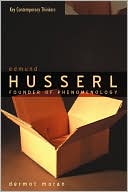

 |

|

The average rating for Edmund Husserl: Founder of Phenomenology based on 2 reviews is 3.5 stars.
Review # 1 was written on 2013-10-29 00:00:00 Gregory Tanner Gregory Tanner291013: more Husserl Husserl's Phenomenology Edmund Husserl: Philosopher of Infinite Tasks Edmund Husserl: Founder of Phenomenology Crisis of European Sciences and Transcendental Phenomenology did i think it would get easier? well, i hoped so, after reading about and by him, about phenomenology, about and by certain followers eg. Sartre, de Beauvoir, Heidegger, Merleau-Ponty. read this several chapters some months past, got distracted, so read it again. interesting to read again, to follow his thoughts not in a narrative but contemplating manner. this is not where best to start, not best to read his thought, perhaps because to certify the author's interpretations of husserl he quotes him often, but only thematically, and the man is not a fluid writer. much of the great innovation of the reduction, the eidetic intuitions, the ultimate idealism of the transcendental reduction, are buried in too many words, too much disclosure of husserl's logic. great logic yes, and if no more, the extensive description is exact, but not very interesting to me... there are some explorations of how husserl came to found phenomenology, in ways i can appreciate, as the 'things themselves', how this focus on the perceived, the given, overcomes kantian 'mythology' of the inaccessible 'thing in itself'. how he recuperates idealism, how he envisages the creation and logic of math. this is a section that does not inspire in me any more look at math, though it does intrigue and shows how these purely rational, idealistic, forms of thought, are mostly based on perceived reality. the problem of imaginary numbers, the problem of complex abstraction of math beyond what we can perceive, the way we create sets, the way we can bracket this or that action. it is clear husserl trained first as a mathematician. it is clear husserl saw the necessity to make philosophy into a science and not science into a philosophy... scientific 'positivism' is not sufficiently without presuppositions, indeed sciences do not investigate themselves, question themselves, but approach the world 'naively', thinking their subjects somehow 'originary' when in fact they are already weighed down in the realm of predetermined logical forms. here, always, the scientist is adopting the 'natural attitude'- that the world is an object independent of subject, the object is 'real' and not partly constructed- in phenomenological terms 'constituted', not invented, but not before sensed. for husserl this dualism is mistaken, how the world precedes the universe, how objectivity is an accomplishment rather than primordial real, which is always subjective. husserl also insists on the intersubjective aspect of the world, of 'monads' and the 'community of monads' together striving towards 'absolute spirit' in an almost Hegelian manner. and here is the difference between 'a priori' and 'eidetic', and here husserl can insist on the overwhelming power of logic... and in some ways it is very good, though he takes an early detour from explicating husserl's thought chronologically, instead trying to unify husserl's thought dispersed through many fragments or shorter works. husserl wrote a lot. but this makes resumption of yearly progress sometimes hard to follow. of course, finding references to ideas of perception that will inspire m-p, are great but brief. author does preface by noting this book will be on husserl, and not on the many philosophers stimulated by him, by phenomenology- but then the last few sections of the final chapter raises up many questions but no answers. this is an introductory text. best to read in class or with a prof or others. hard to feel i understood it all, but sometimes great, sometimes good, always fun... did i say 'fun'? well i have a different idea of 'fun'. i am also always already predisposed to enjoy anything on phenomenology, even when full comprehension is elusive, so do not really know if this is a three or a four. this is probably not the first work on Husserl to read... |
Review # 2 was written on 2008-12-16 00:00:00 Matthew Carswell Matthew CarswellThis is a lovely little book and a nice introduction to Husserl. I highly recommend reading a book like this before tackling Husserl. In fact, I don't really recommend tackling Husserl unless you're into masochism. Perhaps read this and read Ideen Vol 1 or Philosophical Investigations or, as I plan on doing, Crisis in the European Sciences. Husserl is pretty key to understanding a lot of 20th C. Continental Philosophy, so it's pretty crucial to get a good grip on his thought. After reading this, if the idea of reading Husserl strikes you as a joyous affair, then go right ahead. Expect it to sap your libido though. |
CAN'T FIND WHAT YOU'RE LOOKING FOR? CLICK HERE!!!